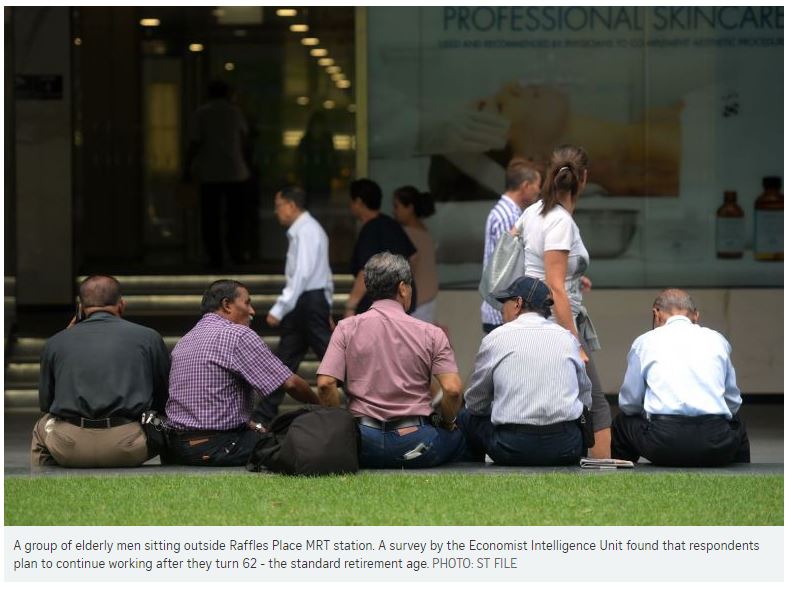Singapore residents expect to continue working after hitting retirement age: Survey
SINGAPORE – People in Singapore are living longer, but their savings may peter out sooner than expected as they enter their golden years.
A survey released on Tuesday (Sept 25) by international research firm Economist Intelligence Unit (EIU) and insurer Prudential found that most respondents say they plan to rely on a wide range of assets to support themselves financially after they turn 62 – the standard retirement age – but they also plan to rely on drawing a salary.
A longer life expectancy is one reason for the inadequate savings.
Other sources of retirement funds could be cash savings, the Central Provident Fund (CPF) and inheritance.
The report, titled Ready for 100? Preparing for longevity in Singapore, polled 1,214 residents in March this year. It is commissioned by insurer Prudential.
“People are just not saving enough for retirement,” said Mr Laurence Lien, chairman of the Lien Foundation, whose expert opinion was sought for the report. “If they are planning for 84 or 88, rather than 90 or 94, they are in for a shock.”
In fact, about three in four respondents in EIU’s survey said they are not financially ready or they do not know if they are financially ready for life until 100.
Survey results showed that 8 per cent of the respondents expect to rely entirely on their salaries after they turn 62 while 44 per cent expect to rely significantly on their salaries. Some 33 per cent said they would rely somewhat on their salaries, and the remaining 15 per cent said they will not rely on their salaries at all.
When asked to what extent do they expect to rely on wages for their lives after 62, respondents ranked salaries 4th, after cash savings, the CPF and national medical insurance schemes.
Chief executive of Prudential Singapore Wilf Blackburn said on Tuesday (Sept 25) that the research findings come as Singaporeans are living longer, underscoring the importance of financial planning.
“Our intent with (the report) is to get people to reimagine life… and how do we plan to spend it,” Mr Blackburn said.
For example, “forming the ability to keep reskilling and learning new things and staying relevant is going to be the most important way that people are going to insure themselves”, he added.
According to Population.sg, an online initiative by the National Population and Talent Division, 1,100 Singaporeans lived to at least 100 in 2015, a rise from the 50 in 1950.
A World Health Organisation report last year stated that the average life expectancy at birth for Singaporeans is 83.1 years, third longest in the world, after the Japanese and the Swiss.
Besides financial well-being, the report covered factors such as health, relationships and work, as these are areas that “are known to contribute to the length and quality of (people’s) years”.
“Living to 100 presents both opportunities and issues to be overcome,” said Mr Blackburn.
“It offers us the promise of being with our loved ones, pursuing work and enjoying lifestyle activities for much longer… at the same time, it requires us to be more self-aware and proactive,” he added.
Source: https://www.straitstimes.com/business/singapore-residents-expect-to-continue-working-after-hitting-retirement-age-survey


 Thailand
Thailand




